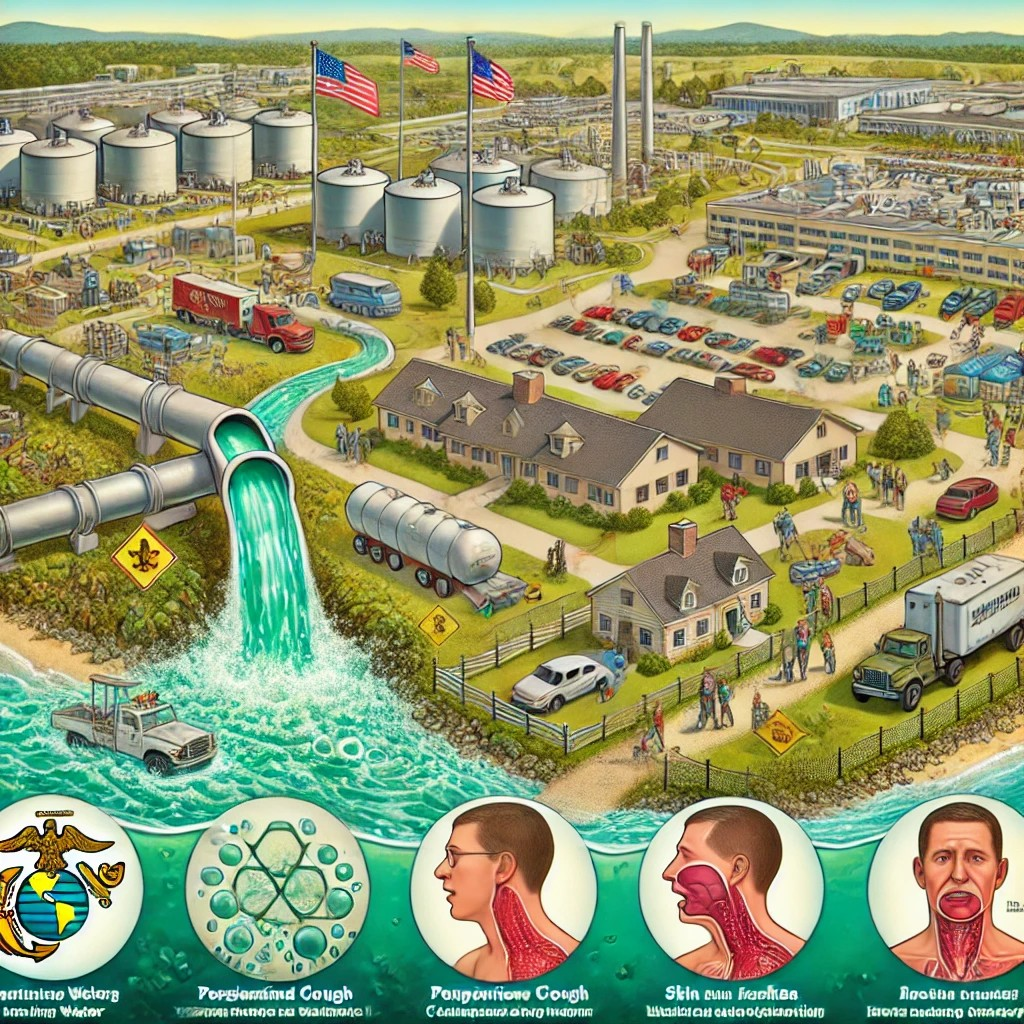Between the 1950s and the 1980s, Camp Lejeune’s contaminated water supply at the U.S. Marine Corps base in North Carolina was tainted with hazardous chemicals. These toxic substances, including volatile organic compounds (VOCs) like trichloroethylene (TCE) and perchloroethylene (PCE), infiltrated the camp lejeune’s drinking water well, posing serious health risks to military personnel, their families, and civilian workers stationed there. Exposure to these contaminants has been linked to a myriad of health issues, some of which have severe, long-term consequences.
Mass Tort America is committed to helping individuals affected by the Camp Lejeune water contamination. We understand the challenges faced by those suffering from related health issues and are dedicated to providing the legal support necessary to seek justice. Our experienced team can guide you through the complex process of securing compensation for your suffering and losses.
Understanding The Health Impact
Exposure to contaminated water at Camp Lejeune has been associated with various cancers and other serious health conditions, commonly referred to as Camp Lejeune toxic water symptoms. Leukemia, kidney cancer, liver and breast cancer, and bladder cancer are among the most commonly reported cancers linked to this exposure. These conditions often manifest after prolonged latency periods, making it difficult to establish a direct connection between the illness and the contaminated water. Moreover, non-cancerous conditions such as severe hepatic steatosis, renal toxicity, and immune system disorders have also been observed.
The severity of health effects depends on multiple factors, including the level and duration of exposure, as well as individual susceptibility. The contaminants at Camp Lejeune, particularly TCE and PCE, are known to damage vital organs and disrupt bodily functions. Long-term exposure to these chemicals can lead to chronic health issues, significantly affecting the quality of life of those impacted. Chronic exposure to these toxic chemicals can result in lasting symptoms and serious health conditions, impacting cognitive function, physical health, and increasing the potential for birth defects. Early detection and medical intervention are crucial for managing these conditions effectively.
In addition to physical health impacts, the emotional and psychological toll on affected individuals and their families cannot be understated. The uncertainty of a latent disease manifesting years or even decades later creates significant anxiety and stress. Addressing both the physical and mental health needs of those affected is essential for comprehensive care and support.
Recognizing The Symptoms
Early detection of camp lejeune victims symptoms related to Camp Lejeune water contamination is critical for timely medical intervention. Symptoms vary widely depending on the type of illness but often include persistent fatigue, unexplained weight loss, and changes in skin coloration or texture. For individuals exposed to high levels of contaminants, symptoms can appear more rapidly and be more severe.
What are the symptoms of contaminated water at Camp Lejeune? Symptoms may vary depending on individual health conditions and specific harmful substances found in the water. Recognizing symptoms such as extreme tiredness and unexplained weight loss is crucial, and victims should seek medical attention promptly.
Cancers linked to water contamination typically present symptoms such as unusual lumps, persistent chest pain, changes in bowel or bladder habits, and chronic cough or hoarseness. These symptoms often go unnoticed until the disease progresses to an advanced stage, underscoring the importance of regular medical check-ups for those who lived or worked at Camp Lejeune during the contamination period.
Non-cancerous conditions may present symptoms like frequent infections, chronic pain, and neurological issues such as memory loss or confusion. These symptoms can be mistaken for less serious ailments, leading to delays in diagnosis and treatment. Health professionals should be aware of common symptoms and the patient’s history of exposure to contaminated water at Camp Lejeune to ensure accurate diagnosis and appropriate care.
Diagnosing And Treating Exposure-Related Conditions
Diagnosing conditions related to Camp Lejeune water contamination often requires a detailed medical history and specialized tests. Blood tests, imaging studies, and biopsies are commonly used to identify cancers and other serious illnesses. Early and accurate diagnosis is vital for implementing effective treatment plans and improving patient outcomes.
Treatment options vary based on the specific condition and its stage of progression. For cancers, treatment may include surgery, chemotherapy, radiation therapy, or a combination of these approaches. Non-cancerous conditions may be managed with medications, lifestyle changes, and supportive therapies to alleviate symptoms and improve quality of life.
Ongoing monitoring and follow-up care are essential for individuals affected by Camp Lejeune water contamination. Regular medical check-ups and screenings can help detect any new or recurring issues early, allowing for prompt intervention. Patients should work closely with their healthcare providers to develop a comprehensive care plan tailored to their specific needs.
Historical Context Of Contamination
The contamination at Camp Lejeune’s drinking water began in the early 1950s and persisted for over three decades, primarily due to improper disposal practices and leaking storage tanks. The main sources of contamination were the Hadnot Point and Tarawa Terrace water treatment plants, which supplied water to the base. These plants were contaminated by chemicals from various sources, including industrial activities and nearby dry-cleaning businesses.
During this period, military service personnel and their families, along with civilian workers, were unknowingly exposed to contaminated water on a daily basis. The lack of awareness and preventive measures exacerbated the situation, allowing the contaminants to permeate the water supply for years. This historical negligence has had lasting repercussions on the health and well-being of those exposed.
Camp Lejeune’s water contamination has been linked to various serious health conditions, including non-Hodgkin’s lymphoma, leukemia, and kidney cancer. It is crucial for individuals who lived or worked there from 1953 to 1987 to consult with a doctor if symptoms related to the contamination arise.
The discovery of the contamination in the 1980s led to significant public outcry and subsequent investigations. The U.S. government has since acknowledged the contamination and its potential health impacts, leading to various legislative measures aimed at providing support and compensation to the affected individuals.
Commonly Used Chemicals In Contaminated Water
Trichloroethylene (TCE) and perchloroethylene (PCE) were the primary contaminants found in Camp Lejeune’s water supply. TCE is a volatile organic compound commonly used as a degreasing agent in metal fabrication and cleaning processes. It is known to be highly toxic and can cause significant damage to the liver, kidneys, and central nervous system upon prolonged exposure.
PCE, on the other hand, is widely used in dry cleaning and industrial degreasing. Similar to TCE, PCE is a potent carcinogen and poses severe health risks when ingested, inhaled, or absorbed through the skin. Long-term exposure to PCE has been linked to various cancers and adverse reproductive effects, making it a major concern for those exposed to contaminated water.
In addition to TCE and PCE, other harmful chemicals such as benzene and vinyl chloride were also present in the camp lejeune’s toxic water supply. Benzene is a well-known carcinogen that can cause bone marrow failure and leukemia, while vinyl chloride is associated with liver cancer and other serious health conditions. The presence of these chemicals further compounds the health risks faced by those exposed to Camp Lejeune’s contaminated water.
Legal Actions And Compensation
In response to the widespread health issues caused by the contamination, numerous legal actions have been taken against the U.S. government. Veterans and their families have sought compensation for the medical expenses, pain, and suffering resulting from their exposure to the toxic, contaminated drinking water well. Various lawsuits have been filed, leading to settlements and legislative measures aimed at providing financial relief to the affected individuals.
The Camp Lejeune Justice Act, passed in 2012, is one such legislative measure that allows veterans and their families to seek compensation for the health problems caused by the contamination. This act acknowledges the government’s responsibility and provides a legal pathway for the affected individuals to obtain the compensation they deserve.
Despite these efforts, many affected individuals still face challenges in accessing the compensation and support they need. Legal proceedings can be complex and time-consuming, requiring the expertise of experienced attorneys who specialize in environmental and toxic torts. Ensuring that all affected individuals receive the justice and compensation they deserve remains an ongoing effort.
Health Monitoring Programs
To address the long-term health impacts of the camp lejeune’s water contamination, various health monitoring programs have been established. These programs aim to provide medical care and support to individuals affected by Camp Lejeune’s contaminated water. The U.S. Department of Veterans Affairs (VA) offers health benefits and compensation to veterans who were exposed to the contaminated water and subsequently developed related health conditions.
In addition to Camp Lejeune, Marine Corps Air Station New River is another facility where individuals may have been exposed to toxic chemicals, leading to cumulative health risks and long-term health consequences.
The VA’s health care program covers a wide range of services, including medical treatments, diagnostic tests, and preventive care. This program is crucial in ensuring that affected individuals receive the necessary medical attention and support to manage their health conditions. Additionally, the VA provides disability compensation to veterans who are unable to work due to their exposure-related illnesses.
Apart from the VA, other organizations and advocacy groups also offer support and resources to affected individuals. These groups play a vital role in raising awareness, providing information, and advocating for the rights of those impacted by the contamination. Collaborative efforts between the government and these organizations are essential in addressing the long-term health needs of the affected population.
Impact On Military Families
The contamination at Camp Lejeune has had a profound impact on military families, many of whom lived on the base for extended periods. Children exposed to the contaminated water at Camp Lejeune are at increased risk for birth defects and developmental disorders. These health issues can have lasting effects on the lives of these children, requiring ongoing medical care and support.
Spouses of military personnel also face significant health risks due to their exposure to the contaminated water. The emotional and financial burden of dealing with chronic illnesses and the associated medical expenses can strain family relationships and overall well-being. Support systems and resources are essential for helping these families cope with the challenges posed by their health conditions.
The impact on military families extends beyond physical health, affecting their mental and emotional well-being. The uncertainty and fear of developing serious illnesses can cause significant stress and anxiety for family members. Providing comprehensive support, including mental health services, is crucial in addressing the holistic needs of affected military families.
Environmental And Ecological Consequences
The contamination at Camp Lejeune has not only affected human health but also had significant environmental and ecological consequences. The toxic chemicals that infiltrated the water supply have seeped into the soil and groundwater, posing a threat to the local ecosystem. These contaminants can persist in the environment for decades, continuing to affect wildlife and plant life in the area.
Efforts to remediate the contaminated sites are ongoing, with various cleanup initiatives aimed at reducing the levels of hazardous chemicals in the environment. These efforts involve extensive testing and monitoring to ensure that the contamination is effectively managed and does not pose further risks to the local ecosystem.
The ecological impact of the contamination highlights the need for stringent environmental regulations and practices to prevent similar incidents in the future. Ensuring the protection of natural resources and the environment is essential in safeguarding public health and preventing long-term ecological damage.
Role Of The U.S. Government
The U.S. government has acknowledged the contamination at Camp Lejeune and its associated health risks. Various federal agencies, including the Environmental Protection Agency (EPA) and the Agency for Toxic Substances and Disease Registry (ATSDR), have conducted extensive investigations into the contamination and its impacts. These agencies have played a crucial role in identifying the sources of contamination and assessing the health risks posed by the toxic chemicals.
Legislative measures, such as the Camp Lejeune Justice Act, have been implemented to provide support and compensation to the affected individuals. These measures represent a recognition of the government’s responsibility and a commitment to addressing the needs of those impacted by the contamination. However, ongoing efforts are needed to ensure that all affected individuals receive the justice and support they deserve.
The role of the government extends beyond providing compensation, encompassing the implementation of preventive measures and regulations to protect public health. Strengthening environmental regulations and ensuring strict enforcement can prevent similar incidents in the future and safeguard the health and well-being of military personnel and their families.
Scientific Studies And Research
Numerous scientific studies and research initiatives have been conducted to understand the health impacts of the contamination at Camp Lejeune. These studies aim to establish a clear link between exposure to the toxic chemicals and the development of various health conditions. The findings of these studies are crucial in informing medical practices and guiding the development of effective treatment and intervention strategies.
Research has shown that exposure to TCE, PCE, benzene, and other contaminants at Camp Lejeune can cause significant damage to vital organs and systems in the body. These findings have been instrumental in shaping public health policies and guiding the provision of medical care to the affected individuals. Ongoing research is essential in uncovering new information and improving our understanding of the long-term health effects of the contamination.
Collaboration between scientists, healthcare providers, and policymakers is vital in addressing the health impacts of the contamination. By sharing knowledge and resources, these stakeholders can develop comprehensive strategies to manage the health needs of those affected and prevent similar incidents in the future.
Challenges In Accessing Compensation
Despite the legislative measures in place, many affected individuals face significant challenges in accessing compensation for their health issues. Legal proceedings can be complex and time-consuming, requiring extensive documentation and evidence to establish a connection between the illness and the contaminated water. Navigating these legal processes can be daunting, especially for individuals dealing with serious health conditions.
The burden of proof often falls on the affected individuals, who must demonstrate that their health issues are directly linked to their exposure to the contaminated water. This requirement can be particularly challenging given the long latency periods of many diseases and the difficulty in obtaining historical medical records. Legal representation is crucial in helping individuals navigate these challenges and secure the compensation they deserve.
Efforts are ongoing to streamline the compensation process and reduce the barriers faced by affected individuals. Advocacy groups and legal experts are working to raise awareness of the challenges and push for reforms that make it easier for individuals to access the support and compensation they need.
Importance Of Community Support
Community support plays a vital role in helping individuals affected by the Camp Lejeune contamination. Support groups and advocacy organizations provide a platform for affected individuals to share their experiences, seek advice, and access resources. These groups offer emotional and practical support, helping individuals cope with the challenges posed by their health conditions.
Local communities can also play a significant role in raising awareness of the contamination and advocating for the rights of those affected. Community-led initiatives, such as awareness campaigns and fundraising efforts, can provide additional support and resources to the affected individuals. Building a strong network of community support is essential in addressing the long-term needs of those impacted by the contamination.
Collaboration between community organizations, healthcare providers, and legal experts is crucial in providing comprehensive support to affected individuals. By working together, these stakeholders can ensure that all aspects of the individuals’ needs are addressed, from medical care to legal assistance and emotional support.
Long-Term Health Monitoring
Long-term health monitoring is essential for individuals affected by the Camp Lejeune contamination. Regular medical check-ups and screenings can help detect any new or recurring health issues early, allowing for prompt intervention. Health monitoring programs, such as those offered by the VA, provide ongoing medical care and support to the affected individuals.
These programs offer a range of services, including diagnostic tests, treatments, and preventive care, ensuring that individuals receive comprehensive medical attention. The VA’s health care program, in particular, is crucial in providing the necessary support and resources to manage the health conditions associated with the contamination.
In addition to medical care, health monitoring programs also offer support for mental and emotional well-being. Counseling and mental health services are essential in addressing the psychological impact of dealing with chronic illnesses and the uncertainty of future health risks. Ensuring access to holistic care is vital in improving the overall quality of life for those affected by the contamination.
Preventive Measures And Lessons Learned
The Camp Lejeune contamination serves as a stark reminder of the importance of preventive measures and stringent environmental regulations. Ensuring proper disposal of hazardous chemicals and regular monitoring of water supplies are essential in preventing similar incidents in the future. The lessons learned from Camp Lejeune highlight the need for proactive measures to protect public health and the environment.
Strengthening environmental regulations and ensuring strict enforcement can prevent the recurrence of such contamination incidents. Regular inspections and monitoring of industrial activities are crucial in identifying potential sources of contamination and addressing them before they pose a threat to public health. Implementing best practices for hazardous waste management is essential in safeguarding water supplies and protecting the environment.
Education and awareness are also key components of preventive measures. Informing the public and industrial stakeholders about the risks associated with hazardous chemicals and the importance of proper disposal practices can help prevent contamination incidents. Building a culture of environmental responsibility is crucial in protecting public health and preventing long-term ecological damage.
Case Studies Pf Affected Individuals
Examining case studies of individuals affected by the Camp Lejeune contamination provides valuable insights into the health impacts and challenges faced by those exposed to the toxic water. These case studies highlight the diverse range of health issues experienced by the affected individuals and the complexities involved in diagnosing and treating these conditions.
For example, one case study may focus on a veteran who developed kidney and lung cancer years after being stationed at Camp Lejeune. The case study would explore the veteran’s medical journey, from initial symptoms to diagnosis and treatment, and the challenges faced in accessing compensation and support. Another case study might examine the experiences of a family whose children were born with birth defects due to their mother’s exposure to the contaminated water during pregnancy.
These case studies provide a human perspective on the impact of the contamination and underscore the importance of comprehensive support and resources for affected individuals. They also highlight the need for ongoing research and advocacy to address the long-term health needs of those impacted by the contamination.
Advocacy And Awareness Efforts
Advocacy and awareness efforts are crucial in addressing the long-term impacts of the Camp Lejeune contamination. Advocacy groups play a vital role in raising awareness of the health risks associated with the contamination and pushing for legislative measures to support affected individuals. These groups work tirelessly to ensure that the voices of those impacted are heard and that their rights are protected.
Awareness campaigns are essential in educating the public and policymakers about the contamination and its long-term adverse health effects. These campaigns can help drive legislative changes and secure the necessary funding and resources to support affected individuals. Building public awareness is crucial in garnering support for advocacy efforts and ensuring that the needs of those impacted are addressed.
Collaboration between advocacy groups, healthcare providers, and legal experts is key in advancing these efforts. By working together, these stakeholders can develop comprehensive strategies to address the health and legal needs of affected individuals and ensure that they receive the justice and support they deserve.
Healthcare Providers’ Role
Healthcare providers play a critical role in addressing the health needs of individuals affected by the Camp Lejeune contamination. These providers are often the first point of contact for individuals experiencing symptoms related neurological diseases due to their exposure and play a key role in diagnosing and managing these conditions. Ensuring that healthcare providers are informed about the contamination and its associated health risks is crucial in providing accurate and timely medical care.
Healthcare providers should be aware of the patient’s history of exposure to contaminated water at Camp Lejeune to ensure accurate diagnosis and appropriate care. Regular medical check-ups and screenings are essential in detecting any new or recurring health issues early, allowing for prompt intervention. Providers should also be equipped to offer comprehensive care, including mental health services, to address the holistic needs of affected individuals.
Collaboration between healthcare providers, researchers, and advocacy groups is vital in advancing our understanding of the health impacts of the contamination and improving patient care. By sharing knowledge and resources, these stakeholders can develop effective treatment and intervention strategies to support the long-term health needs of those affected.
Mass Tort America: How Can We Help?
Mass Tort America is dedicated to supporting individuals affected by the Camp Lejeune water contamination. Our experienced legal team understands the complexities of these cases and is committed to helping you navigate the legal process. We aim to secure the compensation you deserve to cover medical expenses, lost wages, and other damages resulting from your exposure.
We offer personalized service and a concierge team to assist clients nationwide. Our approach ensures that every aspect of your case is handled with care and professionalism. Choosing Mass Tort America means having a dedicated partner in your fight for justice and compensation. Contact us today at 800-356-4338 or through our contact form at https://masstortamerica.com/contact/ to learn more about how we can assist you.



















